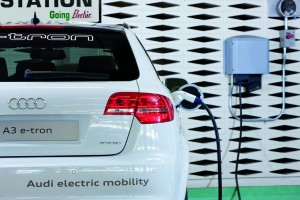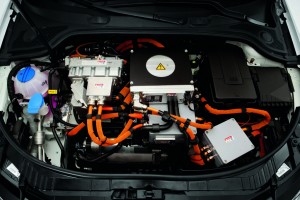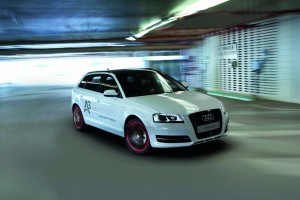
The Audi A3 e-tron will deliver about 30 miles per charge, with a tentative rating of over 150 MPG-e.
Audi will move a big step closer to launching its battery-powered sub-brand when it reveals the new A3 e-tron at the Geneva Motor Show early next month.
Like many of its key competitors, the luxury maker has been toying with a variety of electric drivelines, from conventional hybrids up to pure battery drive, but it appears to be ready to place its chips on plug-in hybrid power as offering the right balance of price, range and performance.
The March 5th debut of the Audi A3 e-tron at Geneva’s PALExpo Center “will provide a realistic glimpse into the future of mobility as Audi is planning it. The electrification of the drivetrain, above all using plug-in technology, plays a deciding role in the strategy of the brand,” according to an advanced statement describing the new model.
The maker says the A3 e-tron will produce 150 kilowatts, or 204 horsepower, from its electric motor drive system, 258 pound-feet of torque – which it says will “guarantee” sporty performance.
Will not exactly matching one of the Volkswagen subsidiary’s S models, the A3 e-tron will still be able to launch from 0 to 100 km/h, or 62 mph, in 7.6 seconds. That’s about two seconds faster than the Chevrolet Volt. The Audi will have a rated top speed of 222 km/h, or 138 mph.
While range will clearly depend on driving patterns – and you won’t get much with your foot to the floor – the Audi A3 e-tron is expected to deliver 31 miles per charge while the top speed slips to 81 mph in pure electric mode. The maker estimates the plug-in will use just 1.5 liters of fuel per 100 kilometers. For Americans, that works out to 157 miles per gallon. However, the European testing process has routinely generated significantly higher numbers than the tests run in the U.S. for the EPA.
Audi isn’t providing specific details about the batteries, though the range numbers would suggest the A3 e-tron is running with a lithium-ion pack somewhere in the range of 15 to 20 kilowatt-hours.

In hybrid mode, the battery/motor system will increase launch performance while the gas engine revs up.
The combustion engine side of the drivetrain is a 1.4-liter gas TFSI inline-four making 150 hp. It is linked to a 75 kilowatt, or about 100 hp, electric motor and power is then sent to the front wheels through a six-speed e-S tronic gearbox.
“The two powerplants complement one another,” suggests the Audi release, since the electric motor provides near instantaneous torque that gets the A3 e-tron rolling while the TFSI revs up to its peak RPM range.
Audi will offer a driver the opportunity to run the A3 e-tron in pure electric, hybrid or gas-only modes. When the two sources of power are operating together – which Audi calls “boosting” – they also will temporarily deactivate, or glide, when the drive lifts off the throttle. That’s designed to reduce motor braking torque and improve range and efficiency.
A key question is left open by the maker’s release, but could be answered at the Geneva Motor Show news conference: when will the Audi A3 e-tron come to market? Most observers expect it to happen in the relatively near term, though whether that will be as a 2014 or 2015 model remains to be seen.
Audi is by no means the only luxury maker to be pressing into battery propulsion. Cadillac recently unveiled its new ELR, a more luxurious and slightly higher-performance version of the Chevy Volt. Nissan’s high-line Infiniti brand is readying the pure battery-electric LE for launch sometime next year. Mercedes-Benz has a range of electrified models coming, including a full battery-powered version of its SLS supercar. And BMW is soon to launch an all-new battery sub-brand with the debut of its i3 and i8 models.


Clean Diesels are still the best bang-for-the-buck for transportation. Hybrids extend the range but at quite a price premium, in addition to additional maintenance that will only be possible at the authorized dealer. Propane and CNG have gained some support in parts of Europe however.